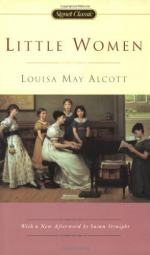Little notice was taken of her stories, but they found a market, and encouraged by this fact, she resolved to make a bold stroke for fame and fortune. Having copied her novel for the fourth time, read it to all her confidential friends, and submitted it with fear and trembling to three publishers, she at last disposed of it, on condition that she would cut it down one third, and omit all the parts which she particularly admired.
“Now I must either bundle it back in to my tin kitchen to mold, pay for printing it myself, or chop it up to suit purchasers and get what I can for it. Fame is a very good thing to have in the house, but cash is more convenient, so I wish to take the sense of the meeting on this important subject,” said Jo, calling a family council.
“Don’t spoil your book, my girl, for there is more in it than you know, and the idea is well worked out. Let it wait and ripen,” was her father’s advice, and he practiced what he preached, having waited patiently thirty years for fruit of his own to ripen, and being in no haste to gather it even now when it was sweet and mellow.
“It seems to me that Jo will profit more by taking the trial than by waiting,” said Mrs. March. “Criticism is the best test of such work, for it will show her both unsuspected merits and faults, and help her to do better next time. We are too partial, but the praise and blame of outsiders will prove useful, even if she gets but little money.”
“Yes,” said Jo, knitting her brows, “that’s just it. I’ve been fussing over the thing so long, I really don’t know whether it’s good, bad, or indifferent. It will be a great help to have cool, impartial persons take a look at it, and tell me what they think of it.”
“I wouldn’t leave a word out of it. You’ll spoil it if you do, for the interest of the story is more in the minds than in the actions of the people, and it will be all a muddle if you don’t explain as you go on,” said Meg, who firmly believed that this book was the most remarkable novel ever written.
“But Mr. Allen says, ’Leave out the explanations, make it brief and dramatic, and let the characters tell the story’,” interrupted Jo, turning to the publisher’s note.
“Do as he tells you. He knows what will sell, and we don’t. Make a good, popular book, and get as much money as you can. By-and-by, when you’ve got a name, you can afford to digress, and have philosophical and metaphysical people in your novels,” said Amy, who took a strictly practical view of the subject.
“Well,” said Jo, laughing, “if my people are ’philosophical and metaphysical’, it isn’t my fault, for I know nothing about such things, except what I hear father say, sometimes. If I’ve got some of his wise ideas jumbled up with my romance, so much the better for me. Now, Beth, what do you say?”
“I should so like to see it printed soon,” was all Beth said, and smiled in saying it. But there was an unconscious emphasis on the last word, and a wistful look in the eyes that never lost their childlike candor, which chilled Jo’s heart for a minute with a forboding fear, and decided her to make her little venture ‘soon’.




